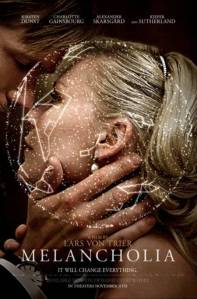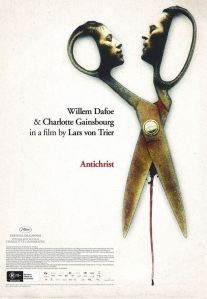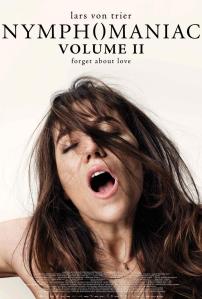My rating: 8
IMDB rating: 7.1
IMDB link: Melancholia
Dearest reader,
Earlier this week, I wrote about the honesty that fascinated me in the movie St. Elmo’s Fire, today I want to continue on this theme by looking at the flipside of honesty as intensive living, by examining honesty as an autobiographical catharsis.
This film, together with Antichrist in 2009 and the Nymphomaniac Volumes in 2013, form part of Lars von Trier’s famous ‘depression trilogy’. Von Trier, is a master in defamiliarization (ostrannenie). Wikipedia describes defamiliarization as “the artistic technique of presenting to audiences common things in an unfamiliar or strange way, in order to enhance perception of the familiar”.
This is similar to Tarantino’s earlier work, as he also presents violence in such a way that it enhances viewers’ sense of the familiar, which seems to be a way of romanticizing violence, but rather is a step backward to gain perspective on violence.
By writing in a depression, about depression, is not only a way of coping with the depression it is also a way of gaining perspective on the depression through a cathartic process. In fact, it was Freud who said that all writers are psychologically impaired and that is why they write.
Von Trier never tries to hide the fact that this particular film is about melancholy, in its various representations. Justine lives by the melancholy, she worships it. When the planet is first truly visible to the human eye, she goes out into the nature and presents herself to it in such a way that it resembles the medieval and Renaissance paintings of virgins offering themselves to the gods.
By doing this there is not only a personification of the depression, the melancholy, it is more of a ‘godification’ or idolization. Justine is so crippled by this clearly hereditary depression, that she cannot even enjoy the wedding to the man she loves. The planet Melancholia, together with the stars that she mentions again and again (which is also symbols throughout the trilogy) seem to govern her sate of mind. As the planet approaches, her depressive state worsens and worsens.
Claire is another story altogether. Claire fears the melancholy. The fear consumes her. She is constantly afraid of being hit by the melancholy (Melancholia). She also fears for the life of her son, what his life would be like if melancholy (Melancholia) would hit him.
The most interesting reaction to the melancholy, to me, comes from Claire’s husband, John. John is fascinated by Melancholia. Although he rejects the feelings of his wife and sister-in-law, he is fascinated by the thing itself. When he is eventually faced with melancholy himself, when he realizes that the planet is going to hit, he is not able to face that reality. He kills himself, again showing that in Von Trier’s films, it is the women that are represented as the strong and the courageous.
In the end it is Justine, who has offered herself to Melancholia again and again, that realizes the inevitability of melancholy (Melancholia) and its total destruction.
To me, this film ties the trilogy together, perfectly. Most of the symbols in Antichrist is re-emphasized, while preparing one for their occurrence in Nymphomaniac. While in the other two films depression is dealt with indirectly and metaphorically, this film faces it head-on. Your biggest mistake would be thinking that this film is merely a sci-fi film.
Want to read more on Melancholia? Try these…



